Paul Collins
Well-known member
Hi,
I went to RSPB Rainham Marshes today, near London, and there were reported sightings yesterday of a dozen rock pipits, 1 or 2 water pipits, and numerous meadow pipits. We definitely saw at least two of the species, but the question is, which two?
We saw all pipits along a sea wall, between the edge of the main reserve's grasses/reedbeds and the rocks along the water's edge.
This first bird was feeding along side some rubbish. We think it is a meadow pipit, because of the pink legs, the light brown colouring, the big eye, the appearance of the breast, and the general jizz. Any confirmation?
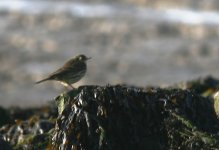
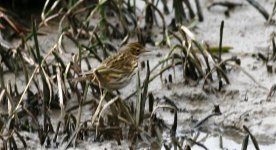
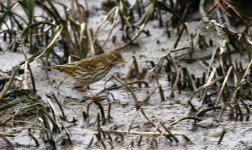
We think the second bird is a rock pipit. It looked slimmer, had darker wings and a less white and less speckled breast, a smaller slit-like eye...
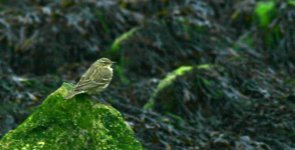
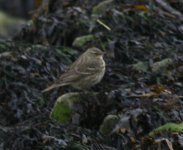
My friend didn't want to rule water pipit though, and neither of us have seen water pipit in winter plumage (I've only ever seen one, in summer plumage, and he's not seen one at all). So if you could explain what makes either bird a rock rather than a water pipit, or a water pipit rather than a rock, that would be great, thanks!
Paul
I went to RSPB Rainham Marshes today, near London, and there were reported sightings yesterday of a dozen rock pipits, 1 or 2 water pipits, and numerous meadow pipits. We definitely saw at least two of the species, but the question is, which two?
We saw all pipits along a sea wall, between the edge of the main reserve's grasses/reedbeds and the rocks along the water's edge.
This first bird was feeding along side some rubbish. We think it is a meadow pipit, because of the pink legs, the light brown colouring, the big eye, the appearance of the breast, and the general jizz. Any confirmation?



We think the second bird is a rock pipit. It looked slimmer, had darker wings and a less white and less speckled breast, a smaller slit-like eye...


My friend didn't want to rule water pipit though, and neither of us have seen water pipit in winter plumage (I've only ever seen one, in summer plumage, and he's not seen one at all). So if you could explain what makes either bird a rock rather than a water pipit, or a water pipit rather than a rock, that would be great, thanks!
Paul



